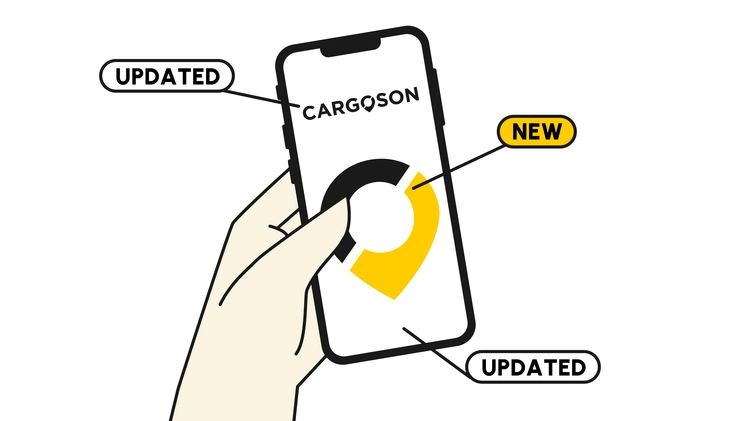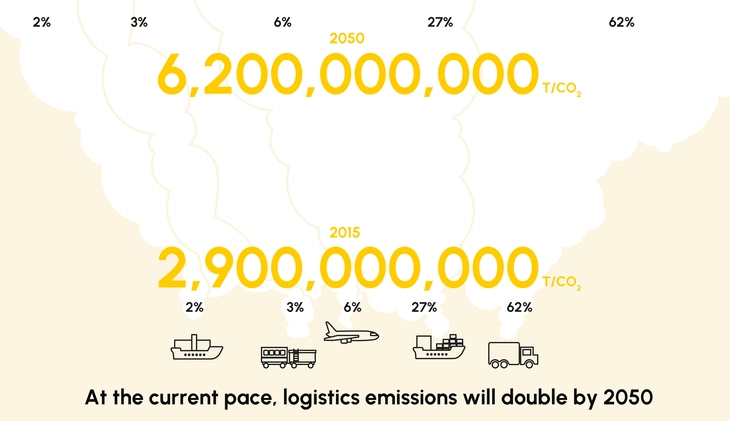Is there room for AI in the logistics sector?
AI (Artificial Intelligence) — what is it? Is there even such thing as truly intelligent system? Hardly. Still nowadays this term is widely used. When some program or system can analyse some data or make some predictions based on previous events, then automatically it is called AI. It just sounds so cool. People don’t really care if some system is truly intelligent or not. They just expect it does something smart. They expect it does something which human brain is not capable of. Fair enough.
So even though we are not using this term correctly, what are those smart things we could enjoy in logistics? To keep it focused I will concentrate on the communication part of logistics: how to choose the right logistics partners, how to make communication seamless, how to avoid manual interactions, how to increase efficiency, how to raise quality of transport decisions and so on.
Lacing the bootstraps
I will start by outlining the general process of choosing logistics partners — the way it works today and has been for decades.
Firstly, you need to choose right partners to work with. Normally this is done using the freight procurement process. Public invitation is sent to all relevant logistics companies to participate in the transport tender. In the invite the scope and conditions are explained. Expectations. Statistical data for previous period. Input files. Deadlines. Bases for qualification to next rounds. And so on. Finally, 1–5 main partners are selected. Additionally, 5–15 partners are selected to cover unexpected deliveries ad-hoc basis.
This was the easy part. Now everything needs to be set up. Additional details need to be agreed. How to place transport orders, how to communicate, invoicing, tracking, loadings, special arrangements, etc. If API connections are involved — this needs to be built and set up.
Then actual job begins. With old partners it is easier — cooperation is already established. With new partners, In the beginning, there are always drawbacks. Communication takes time to settle in. Maybe API connection needs adjustments. Deliveries are not so smooth in the beginning. Usual stuff. And then next year — start from the beginning.
All and all, there should be plenty room for AI and smart solutions. But how exactly?
Few examples from the field
Few years ago, I was involved in project called AiToldYou.com. This solution is aimed to logistics companies. But it actually works in other fields as well. This solution predicts transport orders per customer (customer = company in this example). Turns out there is relatively steady pattern in average customer bookings. Companies tend to have very similar (if not identical) transport bookings over certain time-period. Either it is raw material for production or simply supply which is consumed in a steady pace. Anyway, there is a pattern. It would be fairly easy to spot a missing booking if you had only very few customers. But what if you have hundreds. And suddenly you discover that you have not heard of 5 of your mid-size customers for 2 months? But what if you had system to tell you that you have missed two bookings from following customers? The true power of such approach is to send booking proposal to your customer just before they would need to book their next booking. Cool, right?
- Perhaps one of the most obvious tasks to attack with AI-like solutions is to pre-select the best logistics partner for given shipment. The idea itself is far from unique and there are hundreds (if not thousands) of solutions offering this. Latest I heard of was www.pickrr.com — but as said, there are very many similar solutions. Some more advanced, some approaching little differently but the idea is similar — based on price, lead-time and past data, the system will propose the best solution for you.
The only thing to keep an eye on is that proposed logistics partner truly is best for you not most lucrative for the system proposing the solution.
- Another challenging task to handle is to monitor which goods are delivered/arrived in-time. More precisely, we want to know if goods are delayed and will not be delivered in-time. Normally it automatically means that some following processes are likely to be delayed and eventually cause lot of trouble. On the other hand, if we have such alert up front, we could do something about it.
Again, the idea is not new. Nor is it technically sophisticated thing to implement. The system simply needs to track shipment current progress and compare this to given ETA (Estimated Time of Arrival). Yet often the challenge is data quality. If we want to build such system which would alert us in case something will likely to be delayed, then we do not want to get false report listing hundreds and hundreds of shipments which have not received relevant status update by carrier.
- Transport price calculator. Perhaps the least AI-like thing in the list. But then again if I would lay out 5 different logistics price-lists on the table — chances are, you would make a mistake reading at least one of them. Doing it many-many time a day is not only annoying but this would be perfect thing to hand over to machine. So, in a way this task qualifies — smart thing which machine can do.
None of the above is truly AI worthy tasks. Helpful — sure. But just not as impressive as you might expect from truly intelligent machine. So, I got curious if AI flagships Alexa/Siri/Google know anything about logistics? I made a test and tried to ask Siri “how much would it cost to send 1 pallet, 500kg, from Berlin, Germany to Paris, France. The response was… expectedly disappointing. It just listed top sites from Google results where I could check/ask/request prices myself. True, Siri is not meant for that. But this is exactly the question asked by many purchase specialists from their logistics manager daily.
On the other hand, this task is not so straight-forward as it might seem at first glance. Transport prices are dependent of hundreds of small aspects like from where, to where, goods quantities, total volumes, goods nature, means of transport, situation on transport market, seasonality, allowed timeframes, co-loads, available resources, who is asking, who is being asked, etc, etc, etc. Then again in most cases indicative price level is more than enough. Official quotation by transport company is not needed to estimate transport cost for some project or shipment — estimate would be more than enough.
Even if the price level is known, the practical challenge remains. How to reach the relevant logistics company? Most of them have their own customer portals where you can key in your details and then book the shipment. Then you have to find another service provider and key the same details in again. But what if you need more scalable solution? What if you have 10 shipments a day? How about 100? 1000?
There are thousands of different logistics companies out there. But there is no unified API standard in logistics world. So, whenever you need to build connection to any of the logistics companies you will have to start from the scratch.
Our take on the topic
We at Cargoson have our own take on the topic. We picked the same two questions we hear being asked so often:
- How much would it approximately cost to ship my goods from A to B?
- How to reach relevant carrier?
To answer the first question, we are aiming for service which would consider most relevant factors and estimate expected market price for given shipment. No actual price requests, no dedicated price-lists, no carrier-based pricing models. We are aiming for a system which would on a weekly basis analyse transport orders data from different sources, adjust results with given key-factors and then from this data would generate expected price level for given shipment. It doesn’t matter if the shipment needs to be shipped just around the corner or needs to be picked up from other side of the world. You just need to enter most relevant parameters of the shipment: from where, to where and something about quantities and the system will suggest expected transport price level. When the time is right, actual price-request can be sent out and then official quotations will be received — but for the indication the initial suggestion would be there.
Estimating the transport cost to any shipment is mathematical, not AI task.
To answer the second question, we have already built the core for our API translator. There are thousands of different logistics companies out there. But there is no unified API standard in logistics world. Our goal is to create one. So that there would be one endpoint to contact, and the messages are then automatically forwarded to relevant logistics company’s API.
We are building a system which can communicate to any logistics company.
Still not AI worthy? Perhaps. But now we do have the foundation to something much more substantial. More to come!






